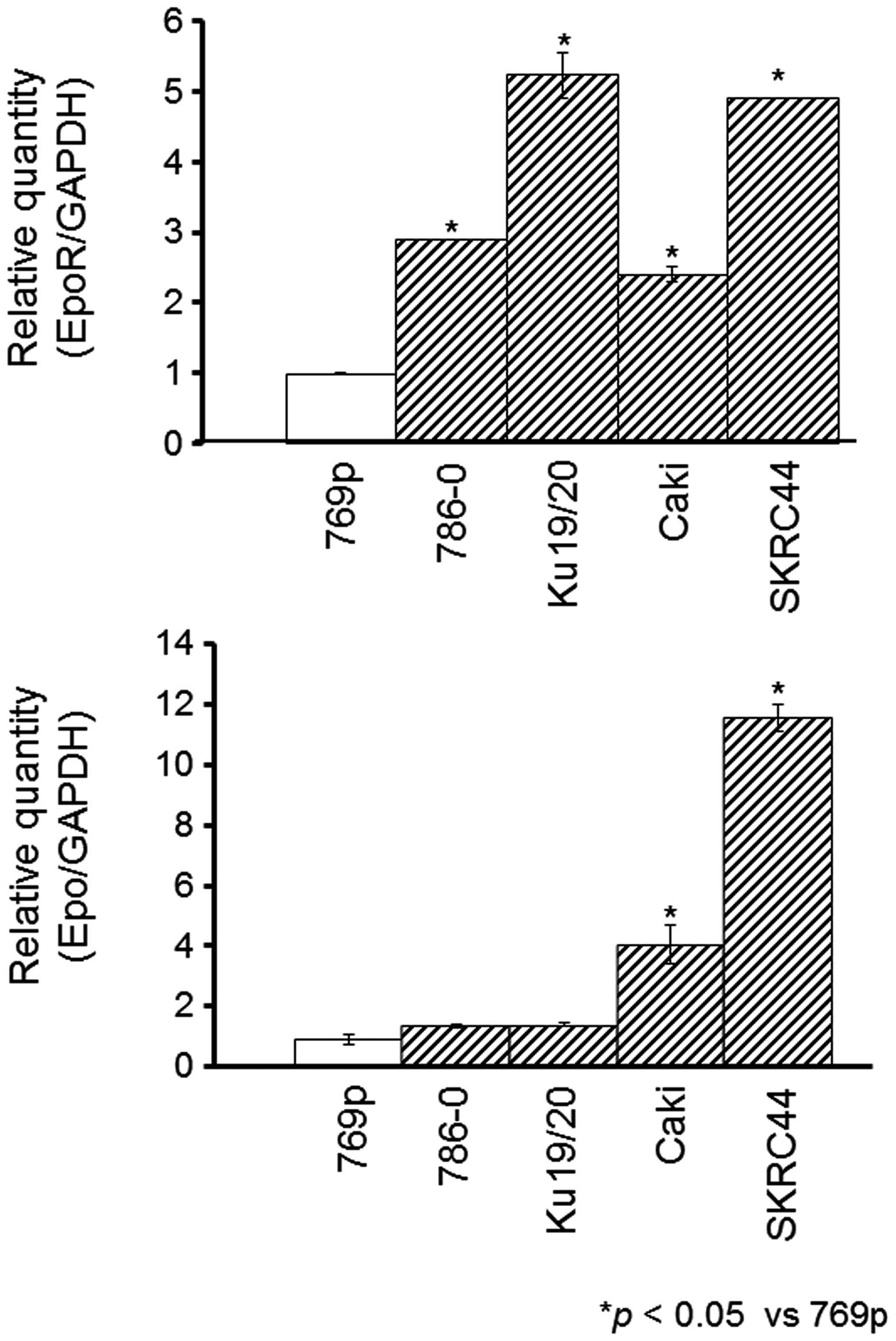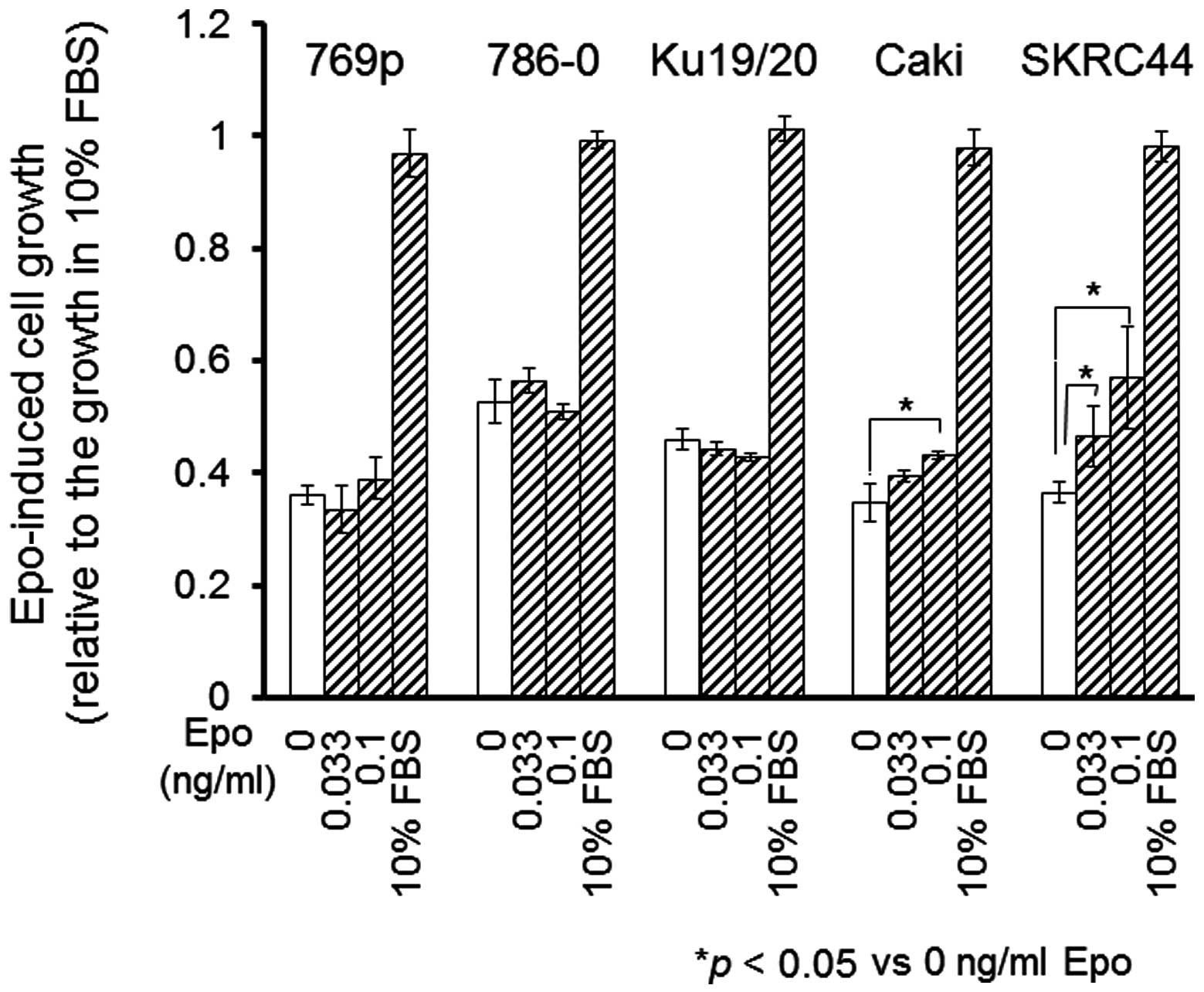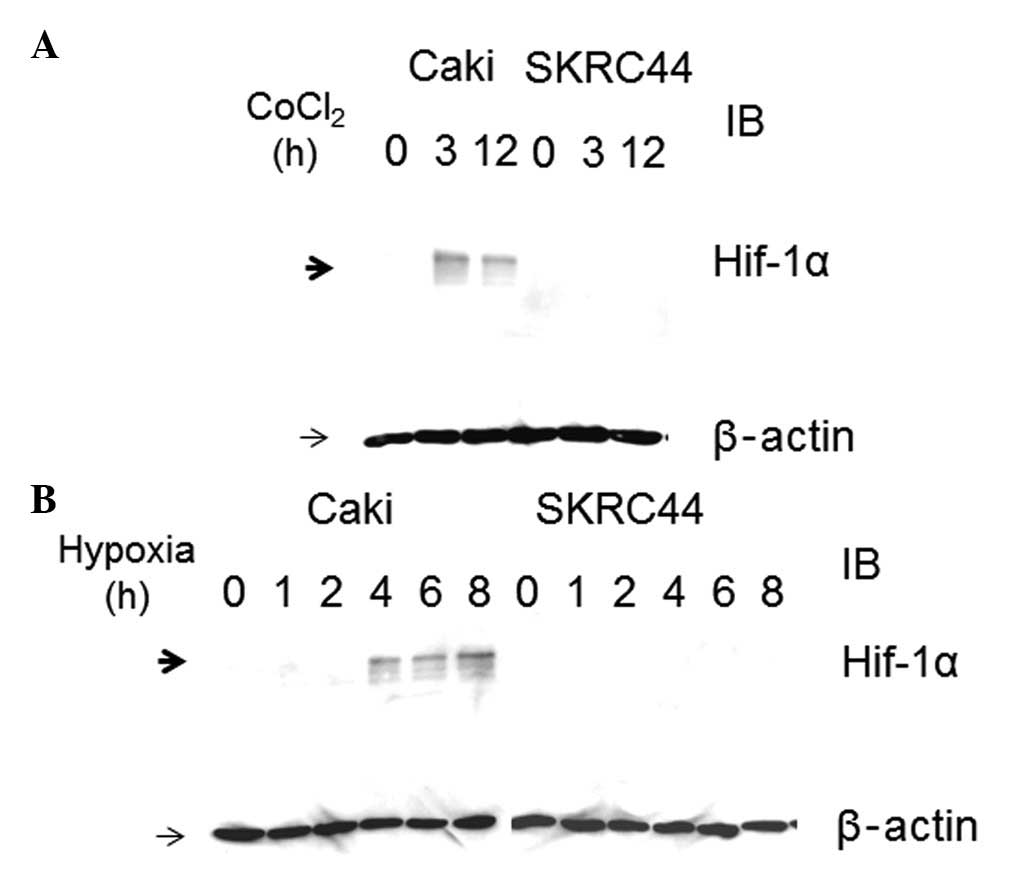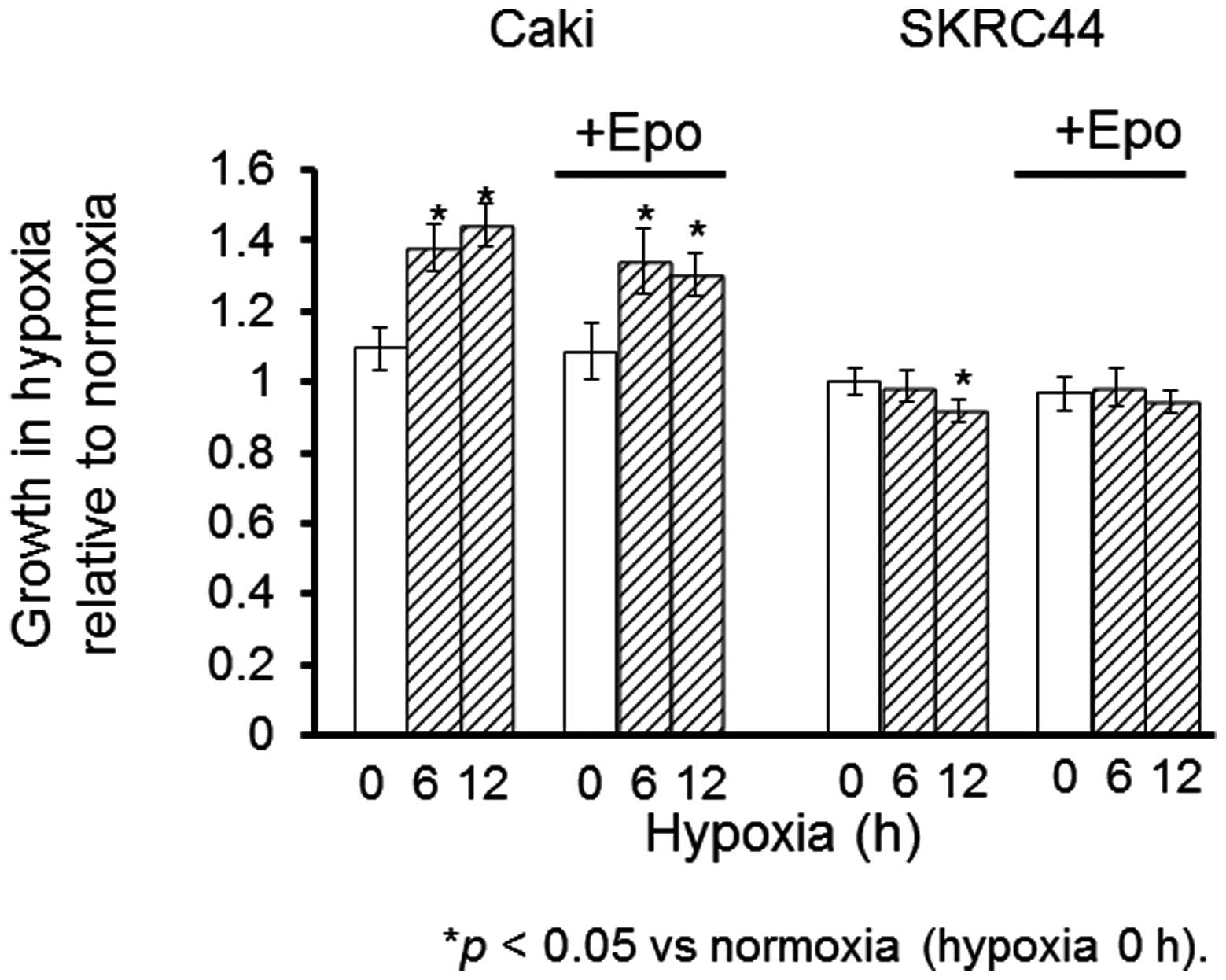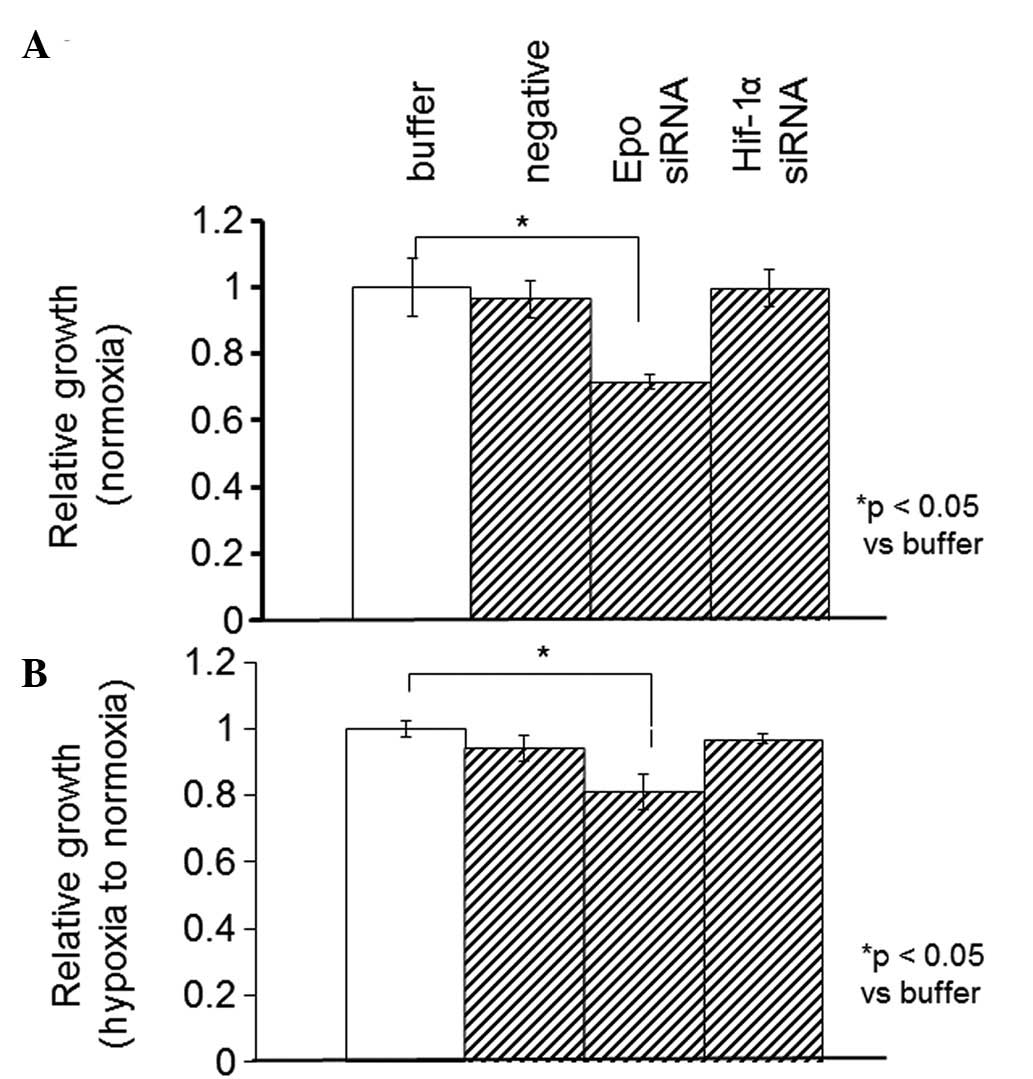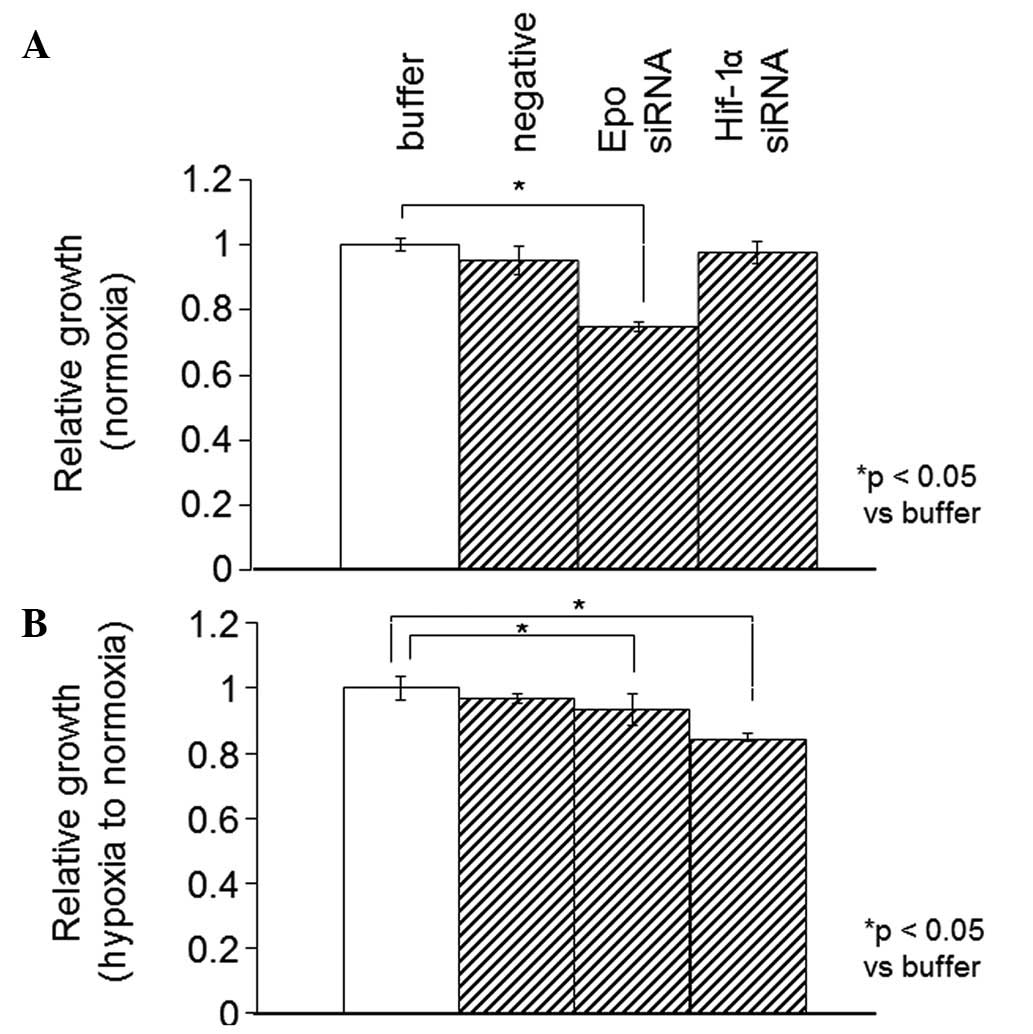|
1
|
Koury ST, Bondurant MC, Koury MJ and
Semenza GL: Localization of cells producing erythropoietin in
murine liver by in situ hybridization. Blood. 77:2497–2503.
1991.PubMed/NCBI
|
|
2
|
Krantz SB: Erythropoietin. Blood.
77:419–434. 1991.PubMed/NCBI
|
|
3
|
Youssoufian H, Longmore G, Neumann D, et
al: Structure, function, and activation of the erythropoietin
receptor. Blood. 81:2223–2236. 1993.PubMed/NCBI
|
|
4
|
Sasaki R, Masuda S and Nagao M:
Erythropoietin: multiple physiological functions and regulation of
biosynthesis. Biosci Biotechnol Biochem. 64:1775–1793. 2000.
View Article : Google Scholar : PubMed/NCBI
|
|
5
|
Winkelmann JC: The human erythropoietin
receptor. Int J Cell Cloning. 10:254–261. 1992. View Article : Google Scholar
|
|
6
|
Vogt C, Pentz S and Rich IN: A role for
the macrophage in normal hemopoiesis: III. In vitro and in vivo
erythropoietin gene expression in macrophages detected by in situ
hybridization. Exp Hematol. 17:391–397. 1989.PubMed/NCBI
|
|
7
|
Anagnostou A, Liu Z, Steiner M, et al:
Erythropoietin receptor mRNA expression in human endothelial cells.
Proc Natl Acad Sci USA. 91:3974–3978. 1994. View Article : Google Scholar : PubMed/NCBI
|
|
8
|
Masuda S, Nagao M, Takahata K, et al:
Functional erythropoietin receptor of the cells with neural
characteristics. Comparison with receptor properties of erythroid
cells. J Biol Chem. 268:11208–11216. 1993.
|
|
9
|
Ogilvie M, Yu X, Nicolas-Metral V, et al:
Erythropoietin stimulates proliferation and interferes with
differentiation of myoblasts. J Biol Chem. 275:39754–39761. 2000.
View Article : Google Scholar : PubMed/NCBI
|
|
10
|
Yasuda Y, Masuda S, Chikuma M, et al:
Estrogen-dependent production of erythropoietin in uterus and its
implication in uterine angiogenesis. J Biol Chem. 273:25381–25387.
1998. View Article : Google Scholar : PubMed/NCBI
|
|
11
|
Juul SE, Zhao Y, Dame JB, et al: Origin
and fate of erythropoietin in human milk. Pediatr Res. 48:660–667.
2000. View Article : Google Scholar : PubMed/NCBI
|
|
12
|
Trimble M, Caro J, Talalla A and Brain M:
Secondary erythrocytosis due to a cerebellar hemangioblastoma:
demonstration of erythropoietin mRNA in the tumor. Blood.
78:599–601. 1991.PubMed/NCBI
|
|
13
|
Bruneval P, Sassy C, Mayeux P, et al:
Erythropoietin synthesis by tumor cells in a case of meningioma
associated with erythrocytosis. Blood. 81:1593–1597.
1993.PubMed/NCBI
|
|
14
|
Yasuda Y, Musha T, Tanaka H, et al:
Inhibition of erythropoietin signalling destroys xenografts of
ovarian and uterine cancers in nude mice. Br J Cancer. 84:836–843.
2001. View Article : Google Scholar : PubMed/NCBI
|
|
15
|
Acs G, Zhang PJ, Rebbeck TR, et al:
Immunohistochemical expression of erythropoietin and erythropoietin
receptor in breast carcinoma. Cancer. 95:969–981. 2002. View Article : Google Scholar : PubMed/NCBI
|
|
16
|
Semenza GL: Hypoxia-inducible factor 1 and
the molecular physiology of oxygen homeostasis. J Lab Clin Med.
131:207–214. 1998. View Article : Google Scholar : PubMed/NCBI
|
|
17
|
Semenza GL: Hypoxia and cancer. Cancer
Metastasis Rev. 26:223–224. 2007. View Article : Google Scholar
|
|
18
|
Du R, Lu KV, Petritsch C, et al: HIF1alpha
induces the recruitment of bone marrow-derived vascular modulatory
cells to regulate tumor angiogenesis and invasion. Cancer Cell.
13:206–220. 2008. View Article : Google Scholar : PubMed/NCBI
|
|
19
|
Powis G and Kirkpatrick L: Hypoxia
inducible factor-1alpha as a cancer drug target. Mol Cancer Ther.
3:647–654. 2004.PubMed/NCBI
|
|
20
|
Ihle JN, Witthuhn BA, Quelle FW, et al:
Signaling by the cytokine receptor superfamily: JAKs and STATs.
Trends Biochem Sci. 19:222–227. 1994. View Article : Google Scholar : PubMed/NCBI
|
|
21
|
Mulcahy L: The erythropoietin receptor.
Semin Oncol. 28(2 Suppl 8): 19–23. 2001. View Article : Google Scholar : PubMed/NCBI
|
|
22
|
Leyland-Jones B: Trastuzumab: hopes and
realities. Lancet Oncol. 3:137–144. 2002. View Article : Google Scholar : PubMed/NCBI
|
|
23
|
Westenfelder C and Baranowski RL:
Erythropoietin stimulates proliferation of human renal carcinoma
cells. Kidney Int. 58:647–657. 2000. View Article : Google Scholar : PubMed/NCBI
|
|
24
|
Ito K, Yoshii H, Asano T, et al: Impact of
increased erythropoietin receptor expression and elevated serum
erythropoietin levels on clinicopathological features and prognosis
in renal cell carcinoma. Exp Ther Med. 3:937–944. 2012.
|
|
25
|
Laugsch M, Metzen E, Svensson T, et al:
Lack of functional erythropoietin receptors of cancer cell lines.
Int J Cancer. 122:1005–1011. 2008. View Article : Google Scholar : PubMed/NCBI
|
|
26
|
Lee YS, Vortmeyer AO, Lubensky IA, et al:
Coexpression of erythropoietin and erythropoietin receptor in von
Hippel-Lindau disease-associated renal cysts and renal cell
carcinoma. Clin Cancer Res. 11:1059–1064. 2005.PubMed/NCBI
|
|
27
|
Maxwell PH and Ratcliffe PJ: Oxygen
sensors and angiogenesis. Semin Cell Dev Biol. 13:29–37. 2002.
View Article : Google Scholar : PubMed/NCBI
|
|
28
|
Kaelin WG Jr: Molecular basis of the VHL
hereditary cancer syndrome. Nat Rev Cancer. 2:673–682. 2002.
View Article : Google Scholar : PubMed/NCBI
|
|
29
|
Lee R, Kertesz N, Joseph SB, et al:
Erythropoietin (Epo) and EpoR expression and 2 waves of
erythropoiesis. Blood. 98:1408–1415. 2001. View Article : Google Scholar : PubMed/NCBI
|
|
30
|
Mitjavila MT, Le Couedic JP, Casadevall N,
et al: Autocrine stimulation by erythropoietin and autonomous
growth of human erythroid leukemic cells in vitro. J Clin Invest.
88:789–797. 1991. View Article : Google Scholar : PubMed/NCBI
|
|
31
|
Wang GL and Semenza GL: General
involvement of hypoxia-inducible factor 1 in transcriptional
response to hypoxia. Proc Natl Acad Sci USA. 90:4304–4308. 1993.
View Article : Google Scholar : PubMed/NCBI
|
|
32
|
Acs G, Chen M, Xu X, et al: Autocrine
erythropoietin signaling inhibits hypoxia-induced apoptosis in
human breast carcinoma cells. Cancer Lett. 214:243–251. 2004.
View Article : Google Scholar : PubMed/NCBI
|
|
33
|
Wincewicz A, Koda M, Sulkowska M, et al:
STAT3 and hypoxia induced proteins - HIF-1alpha, EPO and EPOR in
relation with Bax and Bcl-xL in nodal metastases of ductal breast
cancers. Folia Histochem Cytobiol. 47:425–430. 2009.PubMed/NCBI
|
|
34
|
Semenza GL: Targeting HIF-1 for cancer
therapy. Nat Rev Cancer. 3:721–732. 2003. View Article : Google Scholar
|
|
35
|
Semenza GL: Defining the role of
hypoxia-inducible factor 1 in cancer biology and therapeutics.
Oncogene. 29:625–634. 2010. View Article : Google Scholar : PubMed/NCBI
|
|
36
|
McCarty MF: Barroso-Aranda J and Contreras
F: Practical strategies for suppressing hypoxia-inducible factor
activity in cancer therapy. Med Hypotheses. 74:789–797. 2010.
View Article : Google Scholar : PubMed/NCBI
|
|
37
|
Turner KJ, Moore JW, Jones A, et al:
Expression of hypoxia-inducible factors in human renal cancer:
relationship to angiogenesis and to the von Hippel-Lindau gene
mutation. Cancer Res. 62:2957–2961. 2002.PubMed/NCBI
|
|
38
|
Ohh M, Park CW, Ivan M, et al:
Ubiquitination of hypoxia-inducible factor requires direct binding
to the beta-domain of the von Hippel-Lindau protein. Nat Cell Biol.
2:423–427. 2000. View Article : Google Scholar : PubMed/NCBI
|
|
39
|
Gong K, Zhang N, Zhang K and Na Y: The
relationship of erythropoietin overexpression with von
Hippel-Lindau tumour suppressor gene mutations between
hypoxia-inducible factor-1α and -2α in sporadic clear cell renal
carcinoma. Int J Mol Med. 26:907–912. 2010.PubMed/NCBI
|
|
40
|
Motzer RJ, Escudier B, Oudard S, et al:
Efficacy of everolimus in advanced renal cell carcinoma: a
double-blind, randomized, placebo-controlled phase III trial.
Lancet. 372:449–456. 2008. View Article : Google Scholar : PubMed/NCBI
|
|
41
|
Miyazaki M, Yasuda M, Fujita M, et al:
Therapeutic strategy targeting the mTOR–HIF-1α–VEGF pathway in
ovarian clear cell adenocarcinoma. Path Int. 59:19–27. 2009.
|















